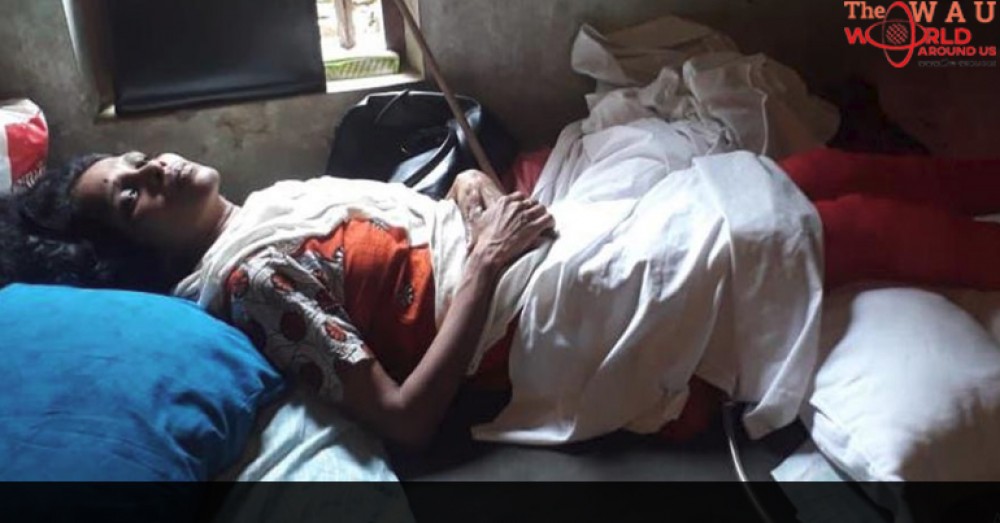Sheeja Das jumped from the second floor of an apartment in Muscat, Oman, where she worked as a housemaid, allegedly to escape torture at the hands of her employer. The 38-year-old, a resident of Kerala, broke her spine and legs in the fall, which left her paralysed from the waist down. With no improvement in her condition after two emergency surgeries at a government hospital in Oman, her employer sent her back to Kerala on May 26 – without any compensation.
Lying in bed in her tiny home in Chirayinkeezhu in Thiruvananthapuram district, Sheeja – who prefers to go by her first name – says it is now impossible for her to get back to normal life. Her husband Bijumon Sadashivan, who worked for the same employer in Oman as an electrician is now looking after his wife. When the suffering gets intense, he gives her painkillers. “We don’t have money to spend for my treatment,” said Sheeja.
Sheeja’s story is a flashback to the ordeal faced by 58-year-old Kasthuri Munirathinam, a Tamil Nadu resident who worked as a maid in Riyadh, Saudi Arabia. On October 8, 2015, her employer reportedly chopped off her right arm for complaining about work conditions and trying to flee the house. External Affairs Minister Sushma Swaraj had responded to the incident almost immediately with a tweet:
Chopping of hand of Indian lady - We are very much disturbed over the brutal manner in which Indian lady has been treated in Saudi Arabia.
— Sushma Swaraj (@SushmaSwaraj) October 9, 2015
There are an estimated 500,000 Indian women working as maids in the six Gulf Cooperation Council countries of Oman, Saudi Arabia, Kuwait, Qatar, Bahrain and the United Arab Emirates. Sheeja Das and Munirathinam are by no means the only ones to have complained of ill-treatment and torture by their employers. Activists and commentators say many more cases go unreported as the victims do not register complaints for fear of losing their earnings and even their lives.

Sheeja Das underwent two emergency surgeries at a government hospital in Oman.
Starved, beaten
Sheeja started working for her employer, a police officer, in Muscat in September 2016. She did not feel insecure because her husband had been with the same employer since 2013.
With their combined earnings, Bijumon – who also goes by his first name – and Sheeja hoped to be able to build their dream home. “I couldn’t complete the construction with my income, so she decided to join me,” Bijumon said.
This March, when the schools in Kerala closed for the summer, the couple took their two children, 13-year-old Sreerup and two-year-old Shobhit, to Muscat.
Bijumon earned 100 Omani rials (approximately Rs 17,500) in a month. Sheeja said she was promised 50 Omani rials (Rs 8,750) a month but did not receive any of it as her employer would deposit the money in her bank account on the first day of the month and withdraw it the same day. This was done to bypass Omani labour law, under which employers must pay labour wages through bank accounts. “The employer promised to give her the full amount after a year but it never happened,” said Bijumon.
He added, “Leave alone the salary, the woman of the house tortured Sheeja everyday. She never gave Sheeja food or water.” As a result, Sheeja’s health began to deteriorate. “She was 48 kg when she first came to Oman. Now, she weighs less than 30 kg,” Bijumon said.
On May 4, the woman of the house beat Sheeja and chased after her when she tried to get away, said Bijumon. “Sheeja ran towards the second floor but the woman continued beating her,” he said. “She [Sheeja] had no option but to jump from the second floor.”
Even when Sheeja was in hospital with serious injuries, her employer tried to send her away quietly to Kerala without any compensation, alleged PM Jabir of the Indian Social Club, a registered socio-cultural forum for Indians in Oman. Jabir is also director of the Kerala Non-Resident Keralites Welfare Board, established by the Kerala government. “His plan was to pack [off] Sheeja immediately,” he said. “He didn’t buy tickets for her husband and two children.”
Jabir said he “brought the family’s plight to the notice of Sushma Swaraj through a tweet”, following which “the Indian embassy in Oman got tickets for the family”.
...[ Continue to next page ]
Share This Post














